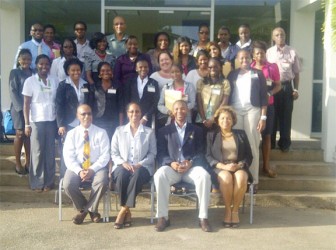By Zoisa Fraser In Barbados
Officials at the Caribbean Examination Council (CXC) are looking to implement a common regional primary assessment programme, which would be a modified and enhanced version of the Common Entrance exam.
Journalists from Guyana, Barbados, Grenada, Trinidad and Antigua among other Caribbean countries were told at a one-day CXC hosted workshop yesterday that the new assessment is already in use in Grenada. Students there are preparing for the external aspect of the programme in the form of an exam later this year.
This move by the CXC will have implications for Guyana, which several years ago phased out Common Entrance replacing it with a three-step assessment programme, which sees exams done at Grades Two, Four and Six. Students’ final marks through which they secure places in secondary schools are a combination of the marks scored at all three assessments.
Senior Assistant Registrar, Examinations Development and Production Division, Dr Gordon Harewood, said the Caribbean Primary Exit Assessment (CPEA) has replaced Common Entrance in Grenada and was being piloted in selected schools in some countries.

Addressing the more than 15 journalists at Alexander Court, Brittons Hill, he said that at a later stage the findings will be published by an independent group of researchers.
“We know that the results will be so convincing that other countries will come on board,“ he said stressing that this multifaceted school based assessment is much broader than Common Entrance as it helps to improve numeracy and literacy.
Harewood said this two-year assessment, which begins in Grade Five, focuses on assessment for learning, assessment of learning and assessment as learning.
He said CXC prefers this system because, among other things, it encourages greater pupil participation, broadens the range of literacies to be assessed and encourages greater parental participation.
It was stressed to journalists that this latest initiative is an attempt by CXC to successfully mould the primary education system, just like the secondary aspect had benefited from the introduction of the Caribbean Secondary Entrance Certificate (CSEC) and Caribbean Advanced Proficiency Examination (CAPE).
Harewood noted that with Common Entrance the child “only had one chance at life. This is why this is different. You develop the literacies and you are tested on it overtime.“
He explained that the assessments which focus on Social Studies, Mathematics, Science and Language are divided into two categories, internal and external.
The internal aspect, which is out of 200 marks, represents 40 per cent of the final score and entails a prepared test by the teacher in the four subject areas; self assessment; practice can do skills; book report; a project and writing portfolio. The external component, which is worth 300 marks and represents 60 per cent of the final score, he said, takes the form of a multiple choice test.
If accepted, CPEA will support the migration of persons and their children from one Caricom country to another.
With this programme, teachers and students will follow the same curriculum they currently use.
This assessment, according to CXC, is based on solid educational and psychometric principles and includes formative and summation assumptions.
CXC firmly believes that formative assessment improves student performance, especially the low achievers and provides information about how far students have reached in the learning journey.
During the interactive workshop, journalists were provided with detailed information on the different CXC programmes including CAPE, CSEC and the Caribbean Certificate of Secondary Level Competence (CCSLC).
During a question and answer session, Assistant Registrar Cleveland Sam explained that there is no distinction at the level of CSEC. He explained that often when students get straight ‘A’ profiles, it is usually referred to as a distinction as opposed to the Grade One that is printed on the results slip. Sam said that is a misconception that ought to be cleared up as there is no distinction grade at the CXC level.
He said too that there is also nothing like “CXCs”, though persons often use this term when referring to CSEC subjects.
Journalists were reminded too that CXC restrains from using the words pass and fail. It was noted that a student with a Grade Four is not a failure and based on his/her profile will have had a moderate understanding of that subject area.
CXC celebrates its 40th year of existence next year.









